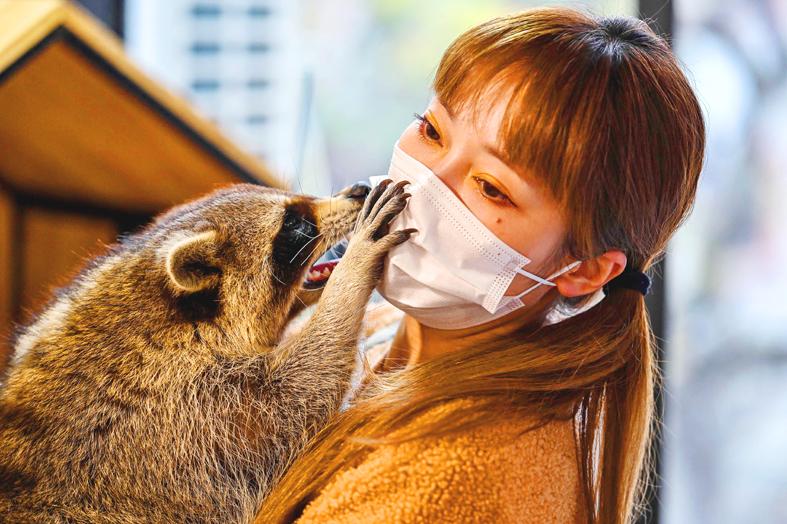A baby raccoon to stroke while you sip your skinny latte? Or a snake to coil around you after your cappuccino?
Forget dog or cat cafes, Shanghai’s animal cafe scene has expanded to include a wider — and more exotic — kingdom.
The fad in dining alongside all manner of species — from raccoons to pigs and reptiles — comes despite concerns fueled by the COVID-19 pandemic about the dangers of deadly viruses jumping from wild animals to humans.

Photo: AFP
There are dozens of animal cafes in China’s biggest city, with visitors helping to drive the craze by posing for photographs with the creatures and sharing them on social media.
Tucked away in central Shanghai, Raccoon Cafe is home to eight of the mammals. The biggest of them, weighing about 10kg, jumps up and down by a window, seemingly agitated by customers.
“I think it’s really cute,” said Qin Siyu, a 27-year-old professional volleyball player who found out about the cafe from a friend’s photographs.
Customers pay from 98 yuan (US$15) for entry, but it is debatable how much of the venue actually functions as a cafe. The raccoons’ behavior is too unpredictable for people to have hot drinks around them and the menu is limited.
The cafe’s owner, Cheng Chen, said that she had no first-hand experience of raccoons before taking over the establishment at the end of last year.
They can be aggressive, Cheng said, and she has the scars on her wrists to prove it.
The 36-year-old understands why some people might question whether it is fair for the raccoons to be kept in a cafe, eating dog food.
Cheng, who seems to have a genuine affection for the raccoons, is an animal lover, and has several dogs and cats at home.
She hopes the government would make it more difficult to own and breed such animals, to prevent them from falling into the hands of people who are less concerned about their welfare.
“Generally, there’s no special regulation. In fact, especially in China, the regulation for pets may be relatively weak,” Cheng said.
In another Shanghai animal cafe, snakes, iguanas and geckos delight the customers.
Owner Wang Liqun has 30 snakes, among them corn snakes and kingsnakes — neither species is venomous, but they can bite.
Wang is yet to have such an incident with a customer.
A visitor who gave only her surname, Tang, said that the cafe helps people to get over their fears.
“After coming here they will feel that it’s not what they thought and may find reptiles actually quite lovely,” the 27-year-old said.
However, Evan Sun (孫全輝), a scientist with World Animal Protection, said that he was “deeply concerned” about such cafes.
“Wild animals are having a miserable life in these cafes, enduring huge suffering and pressure,” said Sun, the charity’s wildlife campaign manager for China.
“The close interactions with wild animals not only fuel suffering and cruelty, but also creates a hotbed of diseases that could exacerbate the likelihood of zoonotic diseases’ emergence and spread,” he said. “Most customers [who] visit animal cafes are animal lovers, but they do not know that their consumption choices have such a negative impact to both wild animals and humans.”

PRECARIOUS RELATIONS: Commentators in Saudi Arabia accuse the UAE of growing too bold, backing forces at odds with Saudi interests in various conflicts A Saudi Arabian media campaign targeting the United Arab Emirates (UAE) has deepened the Gulf’s worst row in years, stoking fears of a damaging fall-out in the financial heart of the Middle East. Fiery accusations of rights abuses and betrayal have circulated for weeks in state-run and social media after a brief conflict in Yemen, where Saudi airstrikes quelled an offensive by UAE-backed separatists. The United Arab Emirates is “investing in chaos and supporting secessionists” from Libya to Yemen and the Horn of Africa, Saudi Arabia’s al-Ekhbariya TV charged in a report this week. Such invective has been unheard of

US President Donald Trump on Saturday warned Canada that if it concludes a trade deal with China, he would impose a 100 percent tariff on all goods coming over the border. Relations between the US and its northern neighbor have been rocky since Trump returned to the White House a year ago, with spats over trade and Canadian Prime Minister Mark Carney decrying a “rupture” in the US-led global order. During a visit to Beijing earlier this month, Carney hailed a “new strategic partnership” with China that resulted in a “preliminary, but landmark trade agreement” to reduce tariffs — but

Chinese President Xi Jinping’s (習近平) purge of his most senior general is driven by his effort to both secure “total control” of his military and root out corruption, US Ambassador to China David Perdue said told Bloomberg Television yesterday. The probe into Zhang Youxia (張又俠), Xi’s second-in-command, announced over the weekend, is a “major development,” Perdue said, citing the family connections the vice chair of China’s apex military commission has with Xi. Chinese authorities said Zhang was being investigated for suspected serious discipline and law violations, without disclosing further details. “I take him at his word that there’s a corruption effort under

China executed 11 people linked to Myanmar criminal gangs, including “key members” of telecom scam operations, state media reported yesterday, as Beijing toughens its response to the sprawling, transnational industry. Fraud compounds where scammers lure Internet users into fake romantic relationships and cryptocurrency investments have flourished across Southeast Asia, including in Myanmar. Initially largely targeting Chinese speakers, the criminal groups behind the compounds have expanded operations into multiple languages to steal from victims around the world. Those conducting the scams are sometimes willing con artists, and other times trafficked foreign nationals forced to work. In the past few years, Beijing has stepped up cooperation